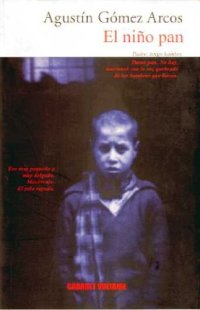
Review of the book “El Niño Bread” by Agustín Gómez Arcos.
“El Niño Bread” by Agustín Gómez Arcos is a moving and disturbing novel that explores the life of a marginalized child in Franco’s Spain in the 1950s. Originally published in 1976, the novel is a masterpiece of social and political realism, and a forceful criticism of the fascist regime that ruled Spain for almost four decades.
The story follows a boy named José María, nicknamed “The Bread Boy”, who lives in a poor neighborhood of Seville with his mother, an alcoholic prostitute. Despite his plight, the boy is intelligent and has a great desire to learn, but he faces limited education and is often ostracized by his classmates.
The author uses a realistic and vivid narrative to describe the boy’s daily life, as well as the horrors of poverty, violence and abuse. The novel also explores the hypocrisy and corruption of the Catholic Church and the brutality of Franco’s police, which were often used to repress those who opposed the regime.
What makes “The Bread Boy” a unique work is its ability to portray the emotional complexity of the child and his ability to find beauty in a heartbreaking world. Despite his suffering, José María finds solace in music, literature and poetry, and develops an unlikely friendship with a priest.
The Bread Boy, by Agustín Gómez Arcos, is a novel that tells the life of a young orphan who lives in a rural village in Andalusia during the Franco dictatorship. The protagonist, nicknamed the bread boy because of his penchant for eating this food, suffers marginalization and abuse from the town’s inhabitants, who consider him an inferior and sinful being. However, the pan boy does not resign himself to his fate and seeks freedom and love in the midst of a hostile and oppressive environment.
The novel is a masterpiece of contemporary Spanish literature, combining social realism with poetic lyricism and mythical symbolism. The author, Agustín Gómez Arcos, was an exiled writer who lived in France from 1966 until his death in 1998. His work reflects his political commitment and his criticism of the repression and intolerance of the Franco regime, as well as his sensitivity towards issues of sexual identity and marginality.
What makes this novel so impactful is the way in which Gómez Arcos manages to capture the experience of war from the perspective of a child. Through Juan’s eyes, we see the brutality and horror of war, but we also see the humanity and compassion that can be found even in the darkest moments.
The Bread Boy is a novel that moves because of its beauty and its rawness, because of its portrait of a dark and miserable Spain, but also because of its message of hope and rebellion. It is essential reading to learn about a part of our recent history and to reflect on the value of human dignity in the face of injustice.
Source: https://algunoslibrosbuenos.com/el-nino-pan


